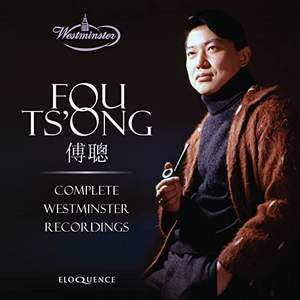The Westminster label legacy of a master Chopin interpreter, issued complete for the first time in an 'original covers' box of new remasterings. Almost half a century before Lang Lang, the pianist Fou Ts'ong took Europe and then the US by storm. With his third-prize finish at the 1955 International Chopin Competition in Warsaw, listeners and critics alike were astonished to encounter a mature and seemingly instinctive feel for the uniquely Polish rhythms and passing harmonies of Chopin's music, under the fingers of a 21-year-old from Shanghai.
Having undertaken further studies in Poland, Fou Ts'ong left his family behind and settled in London to escape the looming shadow of Chinese authoritarianism. He entered into a relationship with the Westminster label, for whom he would record nine albums between 1960 and 1967, all newly remastered and gathered together for the first time in the present collection. They encompass a good range of his repertoire predilections, as well as the scope of his youthful artist maturity. He is also joined by Daniel Barenboim and Vladimir Ashkenazy for a joyous traversal of Mozart's concertos with two and three pianos in a 1972 Decca recording.
His Westminster collection of 12 Scarlatti sonatas was praised at the time for its crisp, modern approach and vividly naturalistic touches. An album of Bach and Handel similarly reveals the intelligence, taste and inherent musicality which Fou Ts'ong brought to this repertoire on the modern concert grand. Several more Westminster albums demonstrate Fou's affinity for Mozart: not so surprising, given that he imprinted on his father's record collection with its 78s of Artur Schnabel and Wanda Landowska.
The pianist may have forsaken his homeland for good, but his musicianship encompassed both European and Chinese aesthetic ideals. He praised Chinese poetry for its strength of feeling without excess: 'It has to remain dignified, spiritual and always beautiful'. These qualities also illuminate the albums of Beethoven and Schubert sonatas collected here.
'The Chinese are also very concerned with detail,' he said: 'Every part must be right, but on the other side the expression must be spontaneous and true,' and an appreciation for this fine balance made him associated above all with the music of Chopin. Although he recorded Chopin's Mazurkas at different times throughout his career, the group of eighteen issued by Westminster arguably represents his interpretations at their freshest and most creative. The Four Ballades likewise established a benchmark of sensitivity among a younger generation of Chopin pianists. The Second Concerto of Chopin, and its original coupling of the Schumann Concerto appear in stereo on CD for the first time. The new collection makes a timely tribute to the artistry of a pianist who died of Covid-19 late last year.
"There is a great deal to enjoy on this record, and it is immensely refreshing to come across a Chopin pianist who thinks too much, if anything I very much hope we shall be hearing more of Fou's Chopin." Gramophone, July 1961
"His technical equipment is marvellous, and his interpretive abilities are ideally suited to the music here." Stereo Review, January 1962 (Chopin: Ballades)
"Fou Ts'ong makes a notable impression with his clean and well-proportioned renditions of these two masterful concertos recorded sound that is completely natural both in balance and warmth of tone." Stereo Review, January 1962 (Mozart: Piano Concertos KV 503 & 595)
"The performances strike me as being within striking distance of ideal he is a remarkably musical pianist." Gramophone, April 1962 (Mozart: Piano Concertos KV 503 & 595)



